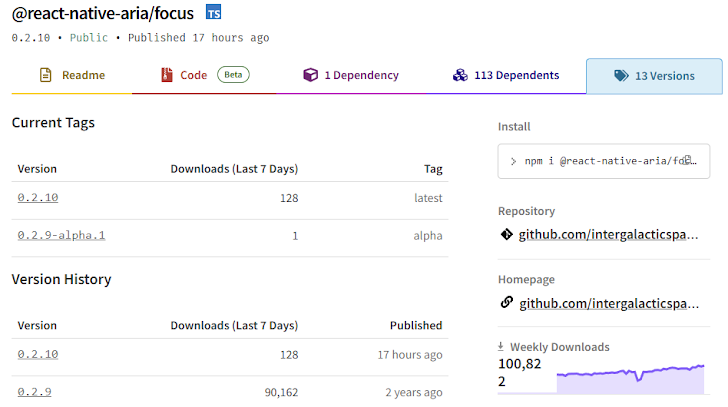New Supply Chain Malware Operation Hits npm and PyPI Ecosystems, Targeting Millions Globally

Cybersecurity researchers have flagged a supply chain attack targeting over a dozen packages associated with GlueStack to deliver malware.
The malware, introduced via a change to "lib/commonjs/index.js," allows an attacker to run shell commands, take screenshots, and upload files to infected machines, Aikido Security told The Hacker News, stating these packages collectively account for nearly 1 million weekly downloads.
The unauthorized access could then be used to perform various follow-on actions like mining cryptocurrency, stealing sensitive information, and even shutting down services. Aikido said the first package compromise was detected on June 6, 2025, at 9:33 p.m. GMT.
The list of the impacted packages and the affected versions is below -
- @gluestack-ui/utils version 0.1.16 (101 Downloads)
- @gluestack-ui/utils version 0.1.17 (176 Downloads)
- @react-native-aria/button version 0.2.11 (174 Downloads)
- @react-native-aria/checkbox version 0.2.11 (577 Downloads)
- @react-native-aria/combobox version 0.2.8 (167 Downloads)
- @react-native-aria/disclosure version 0.2.9 (N/A)
- @react-native-aria/focus version 0.2.10 (951 Downloads)
- @react-native-aria/interactions version 0.2.17 (420 Downloads)
- @react-native-aria/listbox version 0.2.10 (171 Downloads)
- @react-native-aria/menu version 0.2.16 (54 Downloads)
- @react-native-aria/overlay version 0.3.16 (751 Downloads)
- @react-native-aria/radio version 0.2.14 (570 Downloads)
- @react-native-aria/slider version 0.2.13 (264 Downloads)
- @react-native-aria/switch version 0.2.5 (56 Downloads)
- @react-native-aria/tabs version 0.2.14 (170 Downloads)
- @react-native-aria/toggle version 0.2.12 (589 Downloads)
- @react-native-aria/utils version 0.2.13 (341 Downloads)
Furthermore, the malicious code injected into the packages is similar to the remote access trojan that was delivered following the compromise of another npm package "rand-user-agent" last month, indicating that the same threat actors could be behind the activity.
The trojan is an updated version that supports two new commands to harvest system information ("ss_info") and the public IP address of the host ("ss_ip").
The project maintainers have since revoked the access token and marked the impacted versions as deprecated. Users who may have downloaded the malicious versions are recommended to roll back to a safe version to mitigate any potential threats.
"The potential impact is massive in scale, and the malware's persistence mechanism is particularly concerning – attackers maintain access to infected machines even after maintainers update the packages," the company said in a statement.
Malicious Packages Found on npm Unleash Destructive Features
The development comes as Socket discovered two rogue npm packages – express-api-sync and system-health-sync-api – that masquerade as legitimate utilities but implant wipers that can delete entire application directories.

Published by the account "botsailer" (email: anupm019@gmail[.]com), the packages were downloaded 112 and 861 times, respectively, before being taken down.
The first of the two packages, express-api-sync, claims to be an Express API to sync data between two databases. However, once installed and added by an unsuspecting developer to their application, it triggers the execution of malicious code upon receiving an HTTP request with a hard-coded key "DEFAULT_123."
Upon receipt of the key, it executes the Unix command "rm -rf *" to recursively delete all files from the current directory and below, including source code, configuration files, assets, and local databases.
The other package is a lot more sophisticated, acting both as an information stealer and a wiper, while also modifying its deletion commands based on whether the operating system is Windows ("rd /s /q .") or Linux ("rm -rf *").
"Where express-api-sync is a blunt instrument, system-health-sync-api is a Swiss Army knife of destruction with built-in intelligence gathering," security researcher Kush Pandya said.
A notable aspect of the npm package is that it uses email as a covert communication channel, connecting to the attacker-controlled mailbox via hard-coded SMTP credentials. The password is obfuscated using Base64-encoding, whereas the username points to an email address with a domain that's associated with a real estate agency based in India ("auth@corehomes[.]in").
"Every significant event triggers an email to anupm019@gmail[.]com," Socket said. "The email includes the full backend URL, potentially exposing internal infrastructure details, development environments, or staging servers that shouldn't be publicly known."
The use of SMTP for data exfiltration is sneaky as most firewalls do not block outbound email traffic, and allows malicious traffic to blend in with legitimate application emails.
Furthermore, the package resisters endpoints at "/_/system/health" and "/_/sys/maintenance" to unleash the platform-specific destruction commands, with the latter acting as a fallback mechanism in case the main backdoor is detected and blocked.
"Attackers first verify the backdoor via GET /_/system/health which returns the server's hostname and status," Pandya explained. "They can test with dry-run mode if configured, then execute destruction using POST /_/system/health or the backup POST /_/sys/maintenance endpoint with the key "HelloWorld."
The discovery of the two new npm packages shows that threat actors are beginning to branch out beyond using bogus libraries for information and cryptocurrency theft to focus on system sabotage -- something of an unusual development as they offer no financial benefits.
PyPI Package Poses as Instagram Growth Tool to Harvest Credentials
It also comes as the software supply chain security firm discovered a new Python-based credential harvester imad213 on the Python Package Index (PyPI) repository that claims to be an Instagram growth tool. According to statistics published on pepy.tech, the package has been downloaded 3,242 times.
"The malware uses Base64-encoding to hide its true nature and implements a remote kill switch through a Netlify-hosted control file," Pandya said. "When executed, it prompts users for Instagram credentials, and broadcasts them to ten different third-party bot services while pretending to boost follower counts."
The Python library has been uploaded by a user named im_ad__213 (aka IMAD-213), who joined the registry on March 21, 2025, and has uploaded three other packages that can harvest Facebook, Gmail, Twitter, and VK credentials (taya, a-b27) or leverage Apache Bench to target streaming platforms and APIs with distributed denial-of-service (DDoS) attacks (poppo213).
The list of packages, which are still available for download from PyPI, is below -
- imad213 (3,242 Downloads)
- taya (930 Downloads)
- a-b27 (996 Downloads)
- poppo213 (3,165 Downloads)
In a GitHub README.md document published by IMAD-213 about two days before "imad213" was uploaded to PyPI, the threat actor claims that the library is mainly for "educational and research purposes" and notes that they are not responsible for any misuse.
The GitHub description also includes a "deceptive safety tip," urging users to utilize a fake or temporary Instagram account to avoid running into any issues with their main account.
"This creates false security, users think they're being cautious while still handing over valid credentials to the attacker," Pandya said.

Once launched, the malware connects to an external server and reads a text file ("pass.txt") and proceeds further with the execution only if the file content matches the string "imad213." The kill switch can serve multiple purposes, allowing the threat actor to determine who gets access to run the library or turn off every downloaded copy by simply changing the context of the control file.
In the next step, the library prompts the user to enter their Instagram credentials, which are then saved locally in a file named "credentials.txt" and broadcast to ten different dubious bot service websites, some of which link to a network of Turkish Instagram growth tools likely operated by the same entity. The domains were registered in June 2021.
"The emergence of this credential harvester reveals concerning trends in social media-targeted malware," Socket said. "With ten different bot services receiving credentials, we're seeing the early stages of credential laundering – where stolen logins are distributed across multiple services to obscure their origin."
New Mirai botnet infect TBK DVR devices via command injection flaw
Malicious Browser Extensions Infect Over 700 Users Across Latin America Since Early 2025
Free online web security scanner






